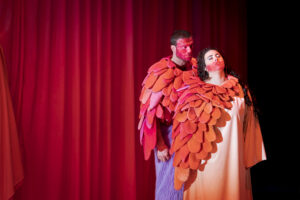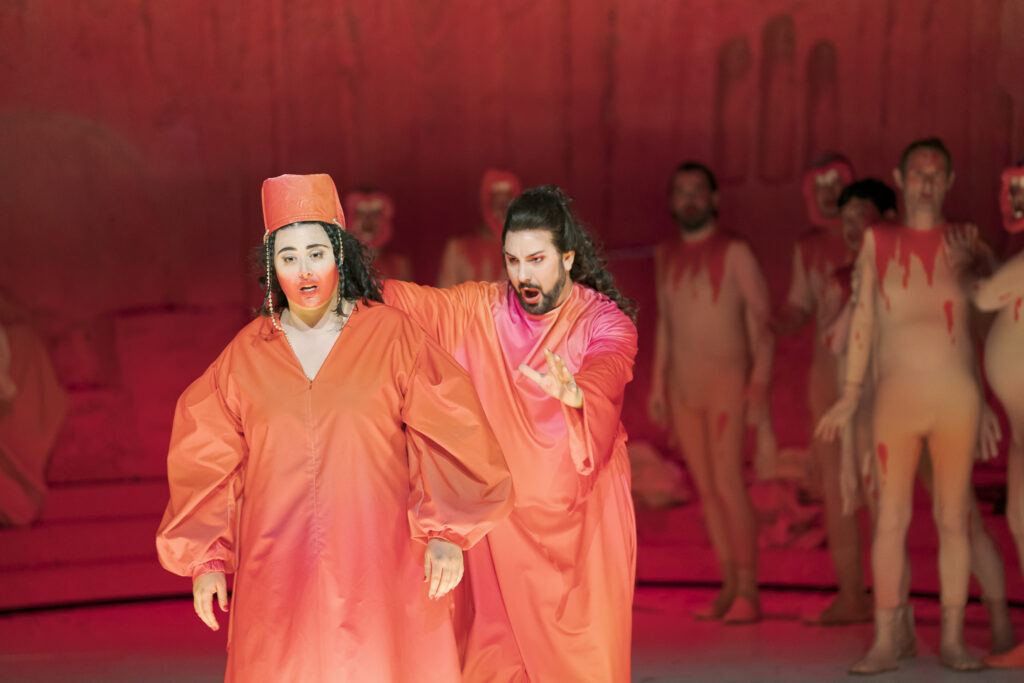Director CezaryTomaszewski has superimposed his agenda onto Donizetti’s (1840) opera, Les Martyrs, which takes place in 3rd Century Armenia, to hijack the opera. But worthy causes don’t necessarily make for great art.
And the production is so gross, ridiculous in its conception, as to demean Donizetti’s musical drama. And so much on stage is caricature and kitsch (in Aleksandra Wasilkowska staging and costumes), to undermine the seriousness of even the political messages.
Yet musically, it’s very competent. The cast is solid, the principal roles are well sung. As Polyeucte, John Osborn impresses, a very fine tenor. In his opening aria, Give me back my bliss, he sings of the Pauline he rescued; sings of his religious conversion, how he was saved.![51668_Les_Martyrs_1__c__Werner_Kmetitsch[1]](https://viennaoperareview.com/wp-content/uploads/2023/12/51668_Les_Martyrs_1__c__Werner_Kmetitsch1-150x150.jpg) From the clandestine ceremony, wearing the white robes for his secret baptism to Christianity, he never loses authority. Also Roberta Mantegna’s Pauline, in her royal red robes, is convincing dramatically as his wife. Now conflicted by the arrival of her ex-lover Severe, who’s ruthlessly committed to execute converted Christians. Unfortunately, Mattia Olivieri’s Sévere, though impressively sung, is marred by a face indelibly dyed in red!
From the clandestine ceremony, wearing the white robes for his secret baptism to Christianity, he never loses authority. Also Roberta Mantegna’s Pauline, in her royal red robes, is convincing dramatically as his wife. Now conflicted by the arrival of her ex-lover Severe, who’s ruthlessly committed to execute converted Christians. Unfortunately, Mattia Olivieri’s Sévere, though impressively sung, is marred by a face indelibly dyed in red!
The bizarre staging upsets the dramatic impact of the principal roles, however well sung. In the opening, two nymph-like figures in bright lurex, cavort, do acrobatics. They’re evil, killers, instruments of mass killings. These ‘glitter boys’, mischievous acrobats left stage; other side of stage, women in fluffy, red kaftans perform a ballet. Meanwhile, Osborn’s Polyeucte, distraught, sings, give me back my happiness. Nude men prance across the stage; it’s announced Sévere is to be the new Roman consul.
Now, opening Act 2, and more political messaging. ARMENIA 1915. Why have you forgotten us? While in the tyrant’s court, red glitter boys (are they a red guard?), pick up papers strewn by the tyrant Felix (Pauline’s father), sung by David Steffens’ splendid bass. He’s the Roman dictator, forever passing edicts, the bureaucracy of empire. ‘God of the Romans, I will serve your wrath!’ he pledges. Behind him priests in red cloaks, in those high hats, and servile, subjugated Armenians. But, oh, he’s wearing, gold satin boxers! The religious leaders in red stand in line behind him, shivering, waving, performing ridiculous dance movements, shaking it all about.
Then we see Felix, top-naked, on his massage couch, (he’s a Roman consul, after all.) Pauline takes over the massage, then joined by (Osborn’s) Polyeucte. Felix plans to pardon him, if he renounces his Christianity.
The Roman victory parade is like a gay pride march, with floats moving across the stage. There’s a warning to rebels who worship the Christian God. ‘It is not difficult to be merciful, when you’re happy, sings Felix, supported on all sides by very pretty boys. A (gay) couple are even making love, side of stage.
Then the ballet, a prerequisite of French grand opéra (19th century), but here maybe not what Donizetti envisaged. Very good choreography, very camp, outrageous young men.
But, on the other, darkened side of the stage, grey-dressed orderlies are building up a pyre of disembodied limbs. The dark side of power. Sévere sings, in his aria, how ‘my happiness depends on the woman he once loved’. Pauline, Mantegna, floats across the stage in a red-hooped dress. Very regal. But all the while corpses are being passed over the wall, as we observe in one instance.
 Pauline’s aria- and her duet with Severe- are a reminder of Donizetti’s greatness, and his influence on the later Verdi. Mantegna’s powerful soprano sings, to you I entrust my fears. Visited by Sévere, she reflects on why she got married; when before, only death could have parted them. They reminisce, but will not continue their romance. She wants him, but is fearful…
Pauline’s aria- and her duet with Severe- are a reminder of Donizetti’s greatness, and his influence on the later Verdi. Mantegna’s powerful soprano sings, to you I entrust my fears. Visited by Sévere, she reflects on why she got married; when before, only death could have parted them. They reminisce, but will not continue their romance. She wants him, but is fearful…
Behind them, in one of the production’s few attractive scenes, men are weaving rugs; oriental, Turkish. They sing of their sweet dream of happiness. Mantegna on a resounding high note, affirms her love. A terrific diva moment.
While Sévere sings, he feels only death, all his time away from her. Farewell cruel woman! She sings, hopes he will find his deserved happiness. In a change of scene- in the love triangle- Osborn’s Polyeucte sings movingly, he loves her not as much as God, but more than himself. Malgré moi.
These beautifully rendered, tender moments are spoiled by absurd staging, disrupting this ‘grand opéra’. The costumes are a mix of pastiche antiquity, and a ‘Star Wars’ episode yet to be seen! And there’s some strange, disturbing violence being perpetrated by the ‘glitter boys’, (the Romans’ red guards.)
And shocking, yet inappropriate within the context of grand opéra, the intervention of the ‘genocide’ argument. Flaccid, white-skinned coloured bodies are being piled up, centre stage. These ‘corpses’ look like limp puppets.
Sévere, Olivieri’s Roman consul, is seen wearing a pink fish-scale outfit. Osborn’s Polyeucte is in a white, religious cassock. I soar up from this world, and defy death, he sings.
While on the same stage, the pile of dead bodies is rising, like lifeless puppets. Pauline begs her father Felix, appealing for his mercy for Polyeucte. There’s a preposterous pink octopus-like creature on stage; fearsome gods of heaven, or science-fiction fantasy.
Sévere, conflicted between ruler and lover, sings, in his aria, he would even pardon ‘the one who took his love from me’ (Polyeucte), but his duty forbids it.
Act 4’s staging, Geschmacklos! (tasteless), so an Austrian critic. In Donizetti, (Eugene Scribe’s libretto), Polyeucte will not renounce his faith. Pauline, who has a vision, decides to die as a martyr, and join her husband (in the lion’s arena.) High drama. But we’re distracted. The romantic, transcendental, love-in-death operatic moment is subverted. Upstaged by modern mercenaries paid to watch the 1915 Armenian massacre, charged as genocide. The red guard glitter boys carry the corpses like loading sacks. Then more agit prop theatre, ‘My name is Aurora’. The Martyrs, Mantegna and Osborn, are joined in a line of ‘modern day’ Armenian victims. Yet defiant, as if appealing to we audience.
But the pantomine we’ve seen on stage besmirches these tragic victims, and does Donizetti’s rarely performed opera no favours. © PR. 28.9.2023
Photos: John Osborn (Polyeucte); Mattia Olivieri (Sévère), Roberta Mantegna (Pauline); Featured image John Osborn (Polyeucte) © Werner Kmetitsch

